Session 2007/2008
Second Report
Committee for Health, Social Services and Public Safety
Report on the Public Health (Amendment) Bill (NIA 8/07)
Together with the Minutes of Proceedings of the Committee relating
to the Report and the Minutes of Evidence
Ordered by the Committee for Health, Social Services and Public Safety to be printed 31 January 2008
Report: 17/07/08R (Committee for Health, Social Services and Public Safety)
PUBLISHED BY AUTHORITY OF THE NORTHERN IRELAND ASSEMBLY
BELFAST: THE STATIONERY OFFICE
£10.50
Membership and Powers
The Committee for Health, Social Services and Public Safety is a Statutory Departmental Committee established in accordance with paragraphs 8 and 9 of the Belfast Agreement, section 29 of the Northern Ireland Act 1998 and under Standing Order 46.
The Committee has power to:
- Consider and advise on Departmental budgets and annual plans in the context of the overall budget allocation;
- Consider relevant secondary legislation and take the Committee stage of primary legislation;
- Call for persons and papers;
- Initiate inquires and make reports; and
- Consider and advise on any matters brought to the Committee by the Minister for Health, Social Services and Public Safety
The Committee has 11 members including a Chairperson and Deputy Chairperson and a quorum of 5.
The membership of the Committee since 9 May 2007 has been as follows:
Mrs Iris Robinson MP (Chairperson)
Ms Michelle O’Neill (Deputy Chairperson)
Mr Thomas Buchanan
Rev Dr Robert Coulter
Dr Kieran Deeny
Mr Alex Easton
Mr Tommy Gallagher
Mrs Carmel Hanna
Mr John McCallister
Ms Carál Ní Chuilín
Ms Sue Ramsey
Table of Contents
Report
Introduction
Consideration of the Bill
Clause by clause consideration of the Bill
Appendix 1
Appendix 2
Appendix 3
Appendix 4
Written Evidence and other Correspondence considered by the Committee
Appendix 5
Introduction
1. The Public Health (Amendment) Bill (NIA 8/07) (the Bill) was referred to the Committee for consideration in accordance with Standing Order 31(1) on completion of the Second Stage of the Bill on 4 December 2007.
2. The Minister for Health, Social Services and Public Safety (the Minister) made the following statement under section 9 of the Northern Ireland Act 1998:
“In my view the Public Health (Amendment) Bill would be within the legislative competence of the Northern Ireland Assembly.”
3. The stated purpose of the Bill is “to amend section 2A of the Public Health Act (Northern Ireland) 1967”.
4. The Committee considered the Bill on 24 January 2008 and 31 January 2008. The relevant extracts from the Minutes of Proceedings for these meetings are included at Appendix 1.
5. The Committee had before it the Public Health (Amendment) Bill (NIA 2/07) and the Explanatory and Financial Memorandum that accompanied the Bill.
6. On referral of the Bill to the Committee after Second Stage, the Committee wrote on 10 December 2007 to key stakeholders and on 11 December 2007 inserted advertisements in the Belfast Telegraph, Irish News and News Letter seeking written evidence on the Bill.
7. Five organisations responded to the request for written evidence and a copy of the submissions received by the Committee is included at Appendix 3.
8. On 15 November 2007 prior to the introduction of the Bill the Committee took evidence from Departmental officials about the policy behind the Bill and its general provisions. Following the referral of the Bill for Committee Stage the Committee took further evidence from Officials on 24 January 2008. The Committee also carried out its clause by clause scrutiny of the Bill on 24 January 2008.
9. At its meeting on 31 January 2008 the Committee agreed its report on the Bill and agreed that it should be printed.
Consideration of the Bill
10. On 15 November 2007, prior to the introduction of the Bill, the Committee took evidence from Departmental officials on the background to the Bill – see Appendix 2. The Department explained that, following new international health regulations introduced by the World Health Organisation, the public health legislation needed to be strengthened to facilitate revision of the Ships and Aircraft Regulations in Northern Ireland. The main purpose of the Regulations will be to improve and modernise the way checks are performed on ships in ports.
Clause by clause consideration of the Bill
11. The Committee undertook its clause by clause scrutiny of the Bill on 24 January 2008 – see Minutes of Evidence in Appendix 2.
Clause 1 – Regulations for control of certain diseases
12. The Committee noted that five responses were received, one was a nil return and the other four were supportive of the provisions in the Clause. The Committee noted the response from the Belfast Harbour Commissioners which urged the urgent introduction of the provisions saying “it is only a matter of time before this situation causes operational difficulties and reputational difficulties to the Port”. The Committee agreed to clause 1.
Clause 2 – Short title
13. The Committee agreed to clause 2.
Appendix 1
Thursday, 15 November 2007
The Board Room,
Northern Ireland Hospice Care
Present:
Mrs Iris Robinson MP MLA (Chairperson)
Mr Thomas Buchanan MLA
Dr Kieran Deeny MLA
Mr Alex Easton MLA
Mr Tommy Gallaher MLA
Ms Michelle O’Neill MLA
Mr John McCallister MLA
Ms Carál Ní Chuilín MLA
Ms Sue Ramsey MLA
In Attendance:
Mr Hugh Farren (Clerk)
Mr Mark McQuade (Assistant Clerk)
Mrs Noelle Bourke (Clerical Supervisor)
Mr Joe Westland (Clerical Supervisor)
Ms Ruth Barry (Clerical Officer)
Apologies:
Rev Robert Coulter MLA
Mrs Carmel Hanna MLA
The meeting commenced at 2.12 p.m. in private session
The meeting Moved to public session at 3.04 p.m.
7. Public Health Amendment Bill
Members were briefed by the following:
Andrew Elliott Director of Population Health Directorate
Seamus Camplisson Health Protection Branch
[Extract]
Thursday, 24 January 2008
Lecture Theatre, Fern House,
Antrim Area Hospital
Present:
Mrs Iris Robinson MP MLA (Chairperson)
Mr Thomas Buchanan MLA
Rev Robert Coulter MLA
Dr Kieran Deeny MLA
Mr Alex Easton MLA
Mr Tommy Gallagher MLA
Mrs Carmel Hanna MLA
Mr John McCallister MLA
Ms Michelle O’Neill MLA (Deputy Chairperson)
In Attendance:
Mr Hugh Farren (Clerk)
Mr Mark McQuade (Assistant Clerk)
Mrs Noelle Bourke (Clerical Supervisor)
Mr Alister Strain (Clerical Supervisor)
Mr Joe Westland (Clerical Officer)
Apologies:
Ms Carál Ní Chuilín MLA
Ms Sue Ramsey MLA
The meeting commenced at 2.30 p.m. in public session.
5. Committee Stage of the Public health (Amendment) Bill
The following witnesses attended:
Andrew Elliott Director of Population Health Directorate
Seamus Camplisson Health Protection Branch
The Chairperson referred the members to a clause by clause briefing paper provided by the Department explaining the purpose of each clause, along with a copy of responses received from relevant bodies.
Clause 1 (Regulations for control of certain diseases.)
Question: That the Committee is content with the clause as drafted, put and agreed to.
Clause 2 (Short Title)
Question: That the Committee is content with the clause as drafted, put and agreed to.
The Committee agreed that a report on the Committee Stage of the Public Health (Amendment) Bill should be drafted for consideration at a later date.
[Extract]
Thursday, 31 January 2008
Room 135, Parliament Buildings
Present:
Mrs Iris Robinson MP MLA (Chairperson)
Mr Thomas Buchanan MLA
Dr Kieran Deeny MLA
Mr Alex Easton MLA
Mr Tommy Gallagher MLA
Mrs Carmel Hanna MLA
Ms Carál Ní Chuilín MLA
Ms Michelle O’Neill MLA (Deputy Chairperson)
In Attendance:
Mr Kevin Shiels (Clerk)
Mr Mark McQuade (Assistant Clerk)
Mrs Noelle Bourke (Clerical Supervisor)
Mr Alister Strain (Clerical Supervisor)
Mr Joe Westland (Clerical Officer)
Apologies:
Rev Robert Coulter MLA
Mr John McCallister MLA
Ms Sue Ramsey MLA
The meeting commenced at 2.35 p.m. in public session.
7. Consideration of the Draft Report on the Committee Stage of the Public Health (Amendment) Bill.
The Committee considered the Draft Report on the Committee Stage of the Public Health (Amendment) Bill paragraph by paragraph. The Committee agreed the main body of the report:
Paragraph 1- 13, read and agreed
The Committee agreed that Appendices 1 to 5 be included in the report.
The Committee ordered the Report on the Public Health (Amendment) Bill (NIA 8/07) to be printed.
The Committee agreed that an extract of today’s Minutes of Proceedings should be included in Appendix 1 of the report
[Extract]
Appendix 2
15 November 2007
Members present for all or part of the proceedings:
Mrs Iris Robinson (Chairperson)
Mrs Michelle O’Neill (Deputy Chairperson)
Mr Thomas Buchanan
Dr Kieran Deeny
Mr Alex Easton
Ms Carál Ní Chuilín
Witnesses:
Mr Seamus Camplisson |
Department of Health, Social Services and Public Safety |
1. The Chairperson (Mrs I Robinson): I welcome Andrew Elliott, the director of the population health directorate, and Seamus Camplisson from the health protection branch. You are both very welcome. I apologise for keeping you waiting. The Committee is dealing with the draft Programme for Government and the draft Budget, and this has been its first major opportunity to pick the brains of the departmental officials.
2. The Minister has advised the Committee that he intends to introduce a Public Health (Amendment) Bill shortly. Officials will brief us on the background and purpose of the Bill, and there will be an opportunity for members to ask questions.
3. Mr Andrew Elliott (Department of Health, Social Services and Public Safety): Thank you very much. Members will have noticed that the Bill is rather short, and I am hoping that my comments can be equally short to reflect that.
4. The Chairperson: Your comments will be welcome.
5. Mr A Elliott: The Bill is a fairly technical piece of work. The World Health Organization introduced new international health regulations that place a requirement on all national Governments to introduce domestic legislation to reflect that. The main purpose of the regulations is to improve and modernise the way in which we can perform checks on ships at ports. When the Department started to examine the legislation in Northern Ireland, it realised that our existing primary legislation was slightly weak. Our legal advice was that the legislation should be amended to ensure that it has clear reference to contamination as well as to infection, and that can pick up a range of modern issues relating to chemical pollution or potentially radioactive material that could be on board a vessel.
6. We sought to include the relevant legislation in a Bill at Westminster before the restoration of devolution. Unfortunately, that Bill was withdrawn at the last minute and the issue has not been progressed. We had no choice but to introduce it as a separate piece of legislation, and that is why the draft Bill is before the Committee today.
7. The Chairperson: Basically, the legislation is tightening up an issue that was not properly dealt with in the past.
8. Mr A Elliott: Once this legislation is in place, we will then proceed to make the regulations that will fulfil the requirements of the World Health Organization.
9. The Chairperson: Have members any comments to make? No comments — after all that waiting. I thank Andrew and Seamus for attending. We note your comments. The legislation will come before the Assembly in due course. Thank you very much.
24 January 2008
Members present for all or part of the proceedings:
Mrs Iris Robinson (Chairperson)
Mrs Michelle O’Neill (Deputy Chairperson)
Mr Thomas Buchanan
Rev Dr Robert Coulter
Dr Kieran Deeny
Mr Alex Easton
Mr Tommy Gallagher
Mrs Carmel Hanna
Mr John McCallister
Witnesses:
Mr Seamus Camplisson |
Department of Health, Social Services and Public Safety |
10. The Chairperson of the Committee for Health, Social Services and Public Safety (Mrs I Robinson): We are now at the Committee stage of the Public Health (Amendment) Bill. I welcome departmental officials Andrew Elliott and Seamus Camplisson. The officials are present to provide clarification and answer questions, as the Committee commences clause-by-clause scrutiny of the Public Health (Amendment) Bill. Members have been provided with a copy of the Bill, submissions to the Committee’s consultations, and a copy of the Hansard report of the Committee briefing by officials on the background to the draft Bill, on Thursday 15 November 2007. Also enclosed is a brief prepared by the Department.
11. I now invite officials to explain the background to the Bill, why it is needed and what it will achieve, before proceeding to the clause-by-clause consideration. I remind members that when the Bill was referred to the Committee before Christmas, the Committee decided to put notices in newspapers, and invite views and comments from a range of relevant organisations. Only four responses have been received, and all are supportive of the provisions in the Bill. I draw your attention also to the response from the Belfast Harbour Commissioners, which urges the urgent introduction of the provisions, saying that:
12. “It is only a matter of time before this situation causes operational difficulties and reputational difficulties to the Port.”
13. You are very welcome, Seamus and Andrew, and I hand over to you to take us through this Bill.
14. Mr Andrew Elliott (Department of Health, Social Services and Public Safety): Thank you very much. It is important to reiterate what I said when we met the Committee at the Children’s Hospice — the Bill is highly technical and is about ensuring that Northern Ireland’s domestic legislation is capable of replicating the international health regulations that were produced by the World Health Organization (WHO) in 2005. As they are applied to all signatory members of WHO, every part of the world has to respond to those international health regulations. Therefore, it is important to ensure that our primary legislation — the Public Health Act (Northern Ireland) 1967 — can replicate those regulations, which is the purpose of the amendment.
15. The Chairperson: Do Members have any questions about the Bill or what Andrew said? If Members are content, we will begin the clause-by-clause scrutiny of the Bill. In effect, the Bill only contains one substantive clause and a second clause, which is the short title. I invite the departmental officials to outline the meaning of clause 1, and questions or discussion after that.
Clause 1 (Regulations for control of certain diseases)
16. Mr Seamus Camplisson (Department of Health, Social Services and Public Safety): The clause extends the Department’s power to make regulations so that it can give the Eastern Health and Social Services Board — which, in Belfast, has the only registered port for such purposes — the power to inspect ships for chemical or radiological contamination in addition to the existing powers to inspect for infectious diseases. That will enable the Department to write new regulations, which are compliant with international health regulations and are, generally, up to date.
Question, That the Committee is content with the clause, put and agreed to.
Clause 1 agreed to.
Clause 2 agreed to.
17. Are Members content that a report on the Committee Stage of the Public Health (Amendment) Bill be drafted for consideration at a later date?
Members indicated assent.
18. That completes the Committee Stage. I thank the Departmental officials for their time.
Appendix 3
Health and Safety Executive Northern Ireland
Public Health (Amendment) Bill
Further to your letter to Jim Keyes seeking a submission from HSENI on the Public Health (Amendment) Bill, I would advise that this subject is not one that is within the remit of HSENI.
I would therefore advise that we have a nil return in this instance.
I have tried to contact you by phone to explain this and am happy to discuss if necessary.
Kevin Toner
Deputy Chief Executive
HSENI
Food Standards Agency Northern Ireland
Public Health (Amendment) Bill
I refer to your request for a written submission on behalf of the FSA on the Public Health (Amendment) Bill.
On consideration of the two clauses contained in the Bill, this organisation is satisfied with the wording therein.
Yours sincerely
Gerry McCurdy
Deputy Director FSA Northern Ireland
Belfast Harbour Commissioners
Public Health (Amendment) Bill
We have reviewed the proposed amendments and insertions to Section 2A of the Public Health Act (Northern Ireland) 1967 (c.36) and consider these to be acceptable in their current form.
We consider this legislation to be important and would urge its expeditious introduction. In the interim, Port Health in Belfast is unable to comply with the UK’s obligations in relation to the World Health Organisation’s International Health Regulations 2005. It is only a matter of time before this situation causes operational difficulties and reputational damage to the Port.
Yours sincerely
Roy Adair
Chief Executive
Ian Lee
Public Health (Amendment) Bill
In response to your invitation with reference to the above Bill I would like to make the following submission. Please be aware that due to time restraints I am responding as an employee of Belfast City Council and not on behalf of the Council. I do however have operational responsibility for the delivery of the Port Health function within Belfast City Council.
The Public Health (Ships) Regulations (NI) 1971 and The Public Health (Aircraft) Regulations (NI) 1971 provide for public health control of ships/aircraft arriving in or leaving Northern Ireland as required by the International Health Regulations 1969.
One of the measures available under these regulations was the inspection of vessels for the presence of rodents which may spread disease and the issuing of deratting certificates (following deratting) or deratting exemption certificates( where no evidence of rodents is found).
Through time, the need to update the International Health Regulations 1969 has become clear and new International Health Regulations 2005 were adopted by the World Health Organisation in 2005 and came into force globally on 15 June 2005.
These regulations deal not just with infectious disease but also with contamination by radiation and chemicals. The International Health Regulations 2005 replaced deratting certificates with new, internationally required, Ship Sanitation Control Certificates and therefore an amendment to Northern Ireland legislation is required to enable Health Authorities in Northern Ireland to issue said certificates. Ship Sanitation Control Certificates are currently requested in Belfast Port on a regular basis by ship owners/agents.
I would therefore fully support the amendment to section 2A of the Public Health Act (Northern Ireland) 1971 as introduced by the Public Health (Amendment) Bill
Yours sincerely
Ian Lee
Western Health and Social Services Board
Public Health (Amendment) Bill
I refer to your letter dated 10 December 2007 seeking the WHSS Board’s response to the above Bill in respect of the Ships and Aircrafts Regulations.
On behalf of the four Health and Social Services Boards, we are content with the proposed amendments to section 2A of the Public Health Act (N Ireland). This will help bring existing regulations in line with EU legislation and the WHO International Health Regulations 2005.
Yours sincerely
Dominic Burke
Acting Chief Executive
Appendix 4
Correspondence of 21 January 2008 from Mr Andrew Elliott
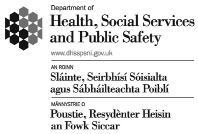
Mr Hugh Farren
Committee Clerk
Health, Social Services and Public Safety Statutory Committee
Northern Ireland Assembly
Room 412
Parliament Buildings
Stormont
Belfast
BT4 3XX
Tel: 02890 520554
Fax: 02890 520574
Email: andrew.elliott@dhsspsni.gov.uk
Your Ref:
Our Ref:
Date: 21 January 2008
From the Director Population Health Directorate
Dear Hugh
Further to our telephone discussion, I am forwarding some further information in regard to the Public Health (Amendment) Bill 2008 and how it would change the Public Health Act 1967. I have enclosed a copy of the relevant part of the Act, with the changes that would result to it marked in bold.
You asked for some background information about International Health Regulations.
The cholera epidemics that overran Europe between 1830 and 1847 were catalysts for intensive diplomacy leading to multilateral cooperation around infectious disease. The first International Sanitary Conference was held in Paris in 1851. In 1948, the World Health Organisation (WHO) Constitution entered into force and in 1951, WHO member states adopted International Sanitary Regulations, which were replaced by the International Health Regulations in 1969. The latter were introduced to help monitor and control four serious diseases that had significant potential to spread between countries. These four notifiable diseases were cholera, plague, yellow fever and smallpox. There were amendments in 1973 and in 1981, when smallpox was excluded, because of its eradication. The aim was to ensure maximum security against the international spread of these diseases but with a minimum interference with world traffic.
The required actions by WHO member states involve notification of cases and notification when an area becomes free from infection as well as making health-related rules for international trade and travel. They also involve measures for deratting, disinfecting and disinsecting international conveyances, such as ships and aircraft and the preparation of health and vaccination certificates for travellers, deratting and deratting exemption certificates and other documentation.
WHO recognised that the risks internationally had changed significantly since 1969 and the successful implementation of the International Health Regulations (IHR) 2005 is intended to contribute significantly to enhanced national, regional and international public health security. The global community has as a result a new legal framework to better manage its collective defences against acute public health risks that can spread internationally and have devastating impacts on human health as well as unnecessary negative interference on travel and trade.
New diseases covered by IHR 2005 include SARS and any new human influenza virus. The regulations also cover other public health emergencies that may affect populations across borders, such as chemical spills, leaks and dumping or nuclear melt-downs.
The concern that led to the preparation of the Public Health (Amendment) Bill (2008) was that the current primary legislation (the Public Health Act 1967) did not provide powers to introduce regulations in Northern Ireland to tackle contamination, as opposed to disease.
I do hope the Committee finds this brief explanation of the IHR background and the enclosures to be of assistance. The Committee will have the opportunity to return to these matters in considerably more detail if the Bill is passed and draft regulations are prepared for consultation.
Yours sincerely

Andrew Elliott
cc Dr McCormick
Dr McBride
Dr Mitchell
Dr Doherty
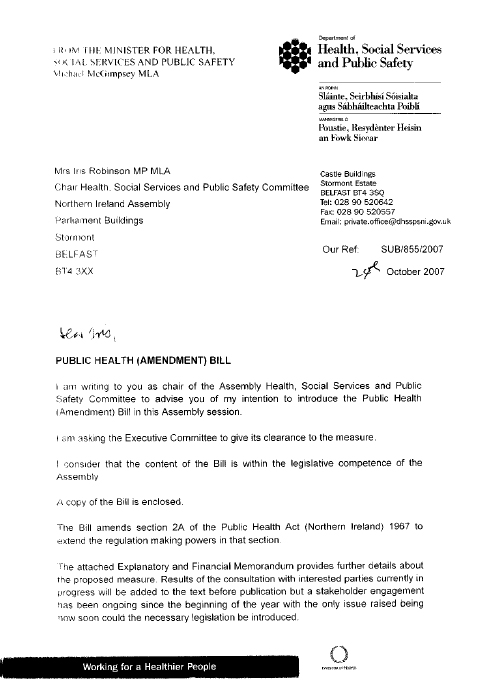
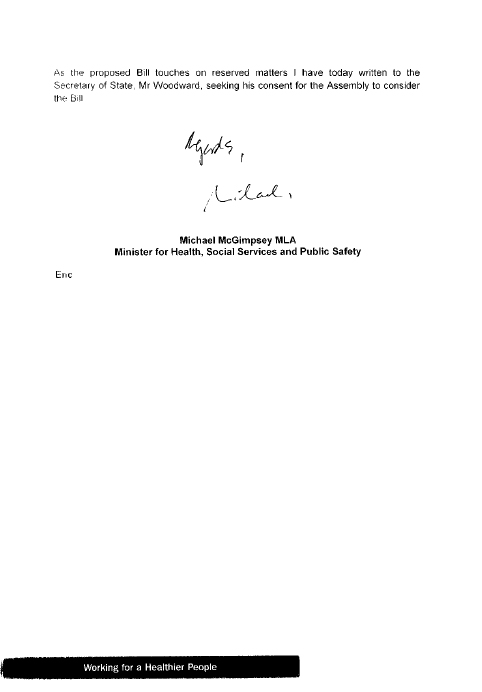
Public Health (Amendment) Bill
[27/06/2007 16:50:22]
Contents
- Regulations for control of certain diseases [j1]
- Short title [j4]
Public Health (Amendment)
A
B I L L
TO
Amend section 2A of the Public Health Act (Northern Ireland) 1967.
BE IT ENACTED by being passed by the Northern Ireland Assembly and assented to by Her Majesty as follows:
Regulations for control of certain diseases [j1]
1. — (1) Section 2A of the Public Health Act (Northern Ireland) 1967 (c. 36) (power to make regulations for control of certain diseases) is amended as follows.
(2) In subsection (1) —
(a) in paragraph (a) at the end omit "and";
(b) after paragraph (b) insert "and
(c) for preventing the spread of infection or contamination by means of any vessel or aircraft leaving any place, so far as may be necessary or expedient for the purpose of carrying out any treaty, convention, arrangement or engagement with any other country,";
(c) after "under sub-paragraph (b)" insert "or (c)".
(3) After that subsection insert —
"(1A) For the purposes of subsection (1)(c) "contamination" means the presence of an infectious or toxic agent or matter on a human or animal body surface, in or on a product prepared for consumption or on other inanimate objects, including conveyances, that may constitute a public health risk.".
Short Title
2. This Act may be cited as the Public Health (Amendment) Act (Northern Ireland) 2007.
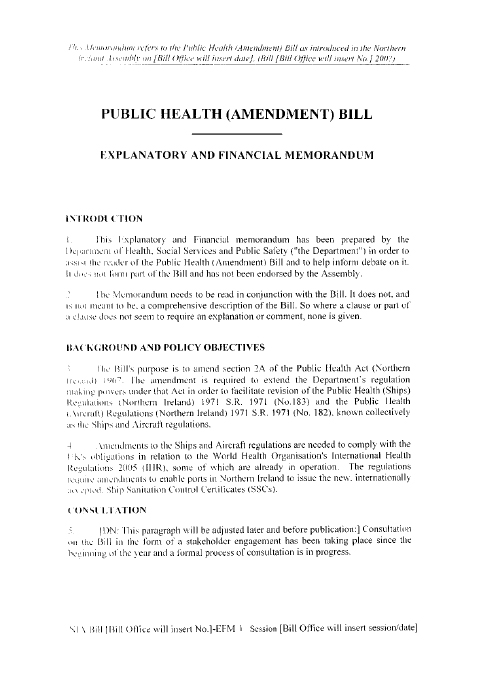
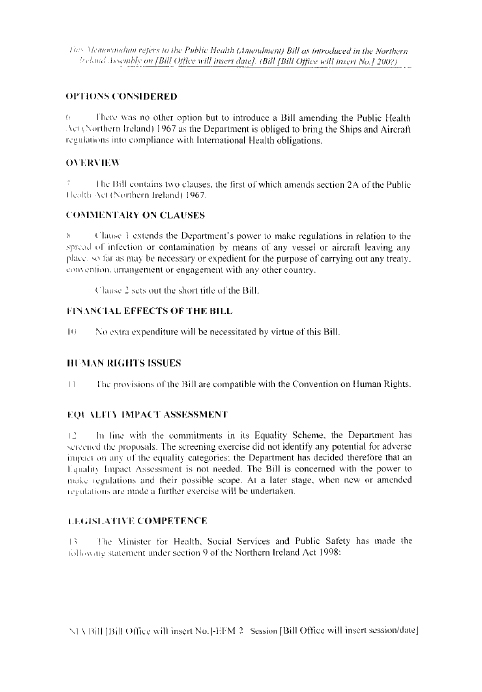
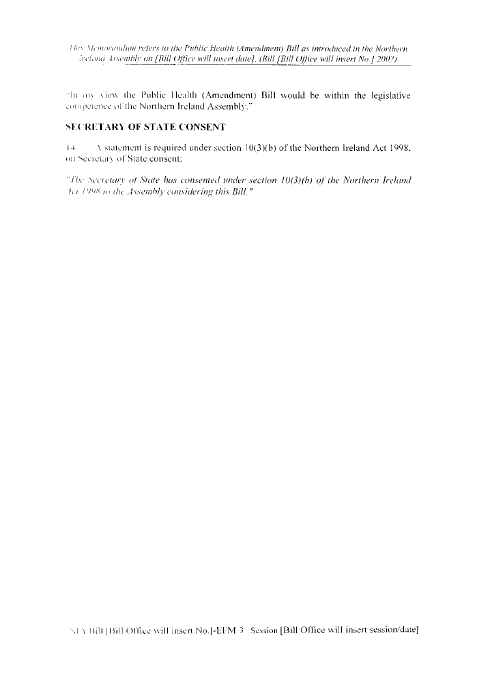
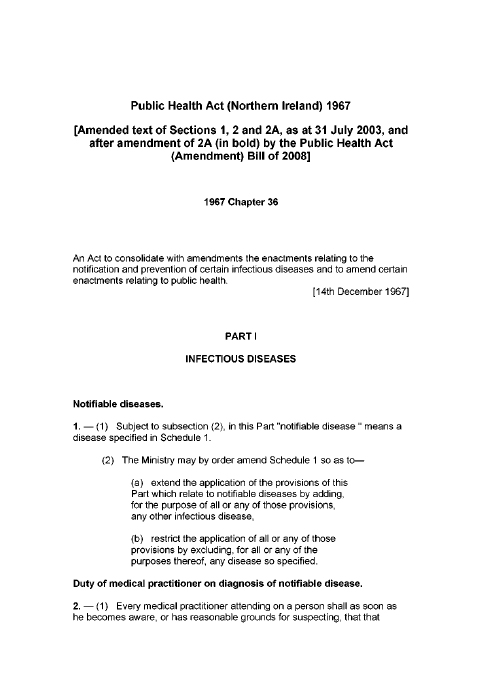
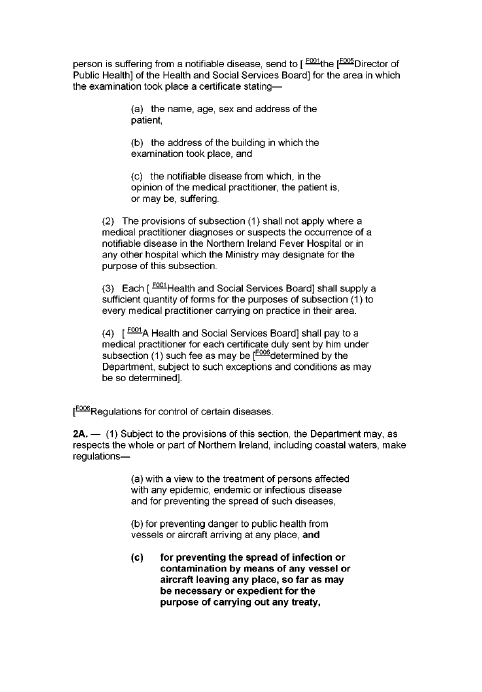
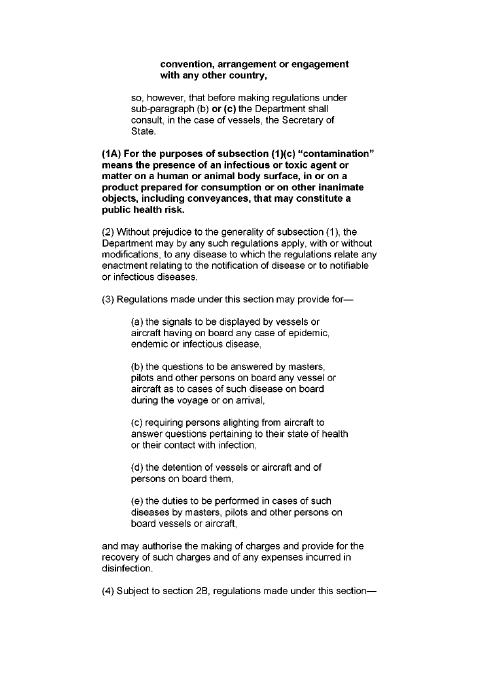
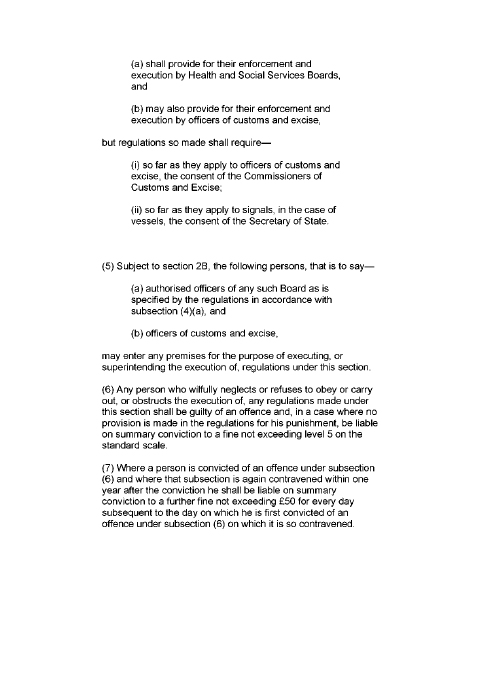
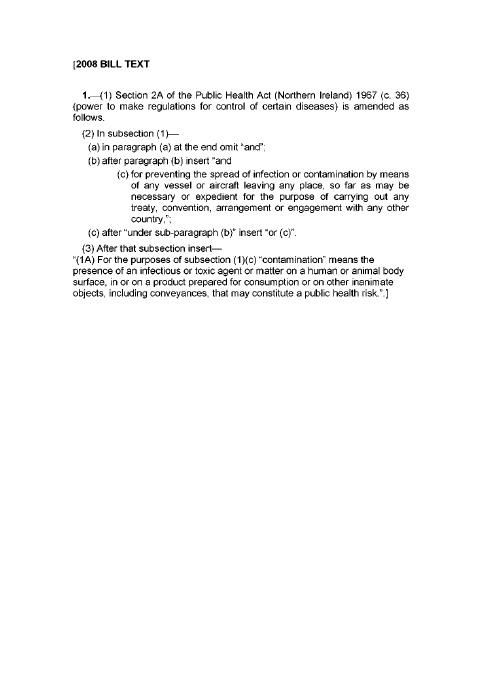
Appendix 5
Mr. Seamus Camplisson Department of Health, Social Services and Public Safety
Mr. Andrew Elliott Department of Health, Social Services and Public Safety
